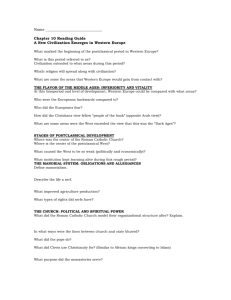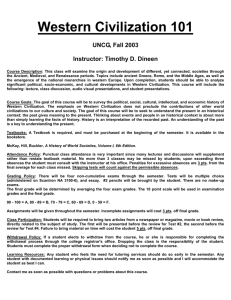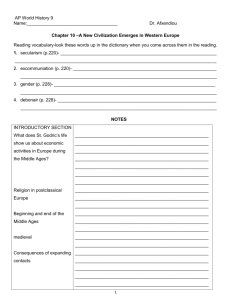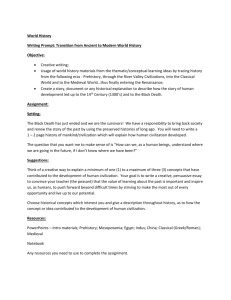Chapter 10 Reading Guide
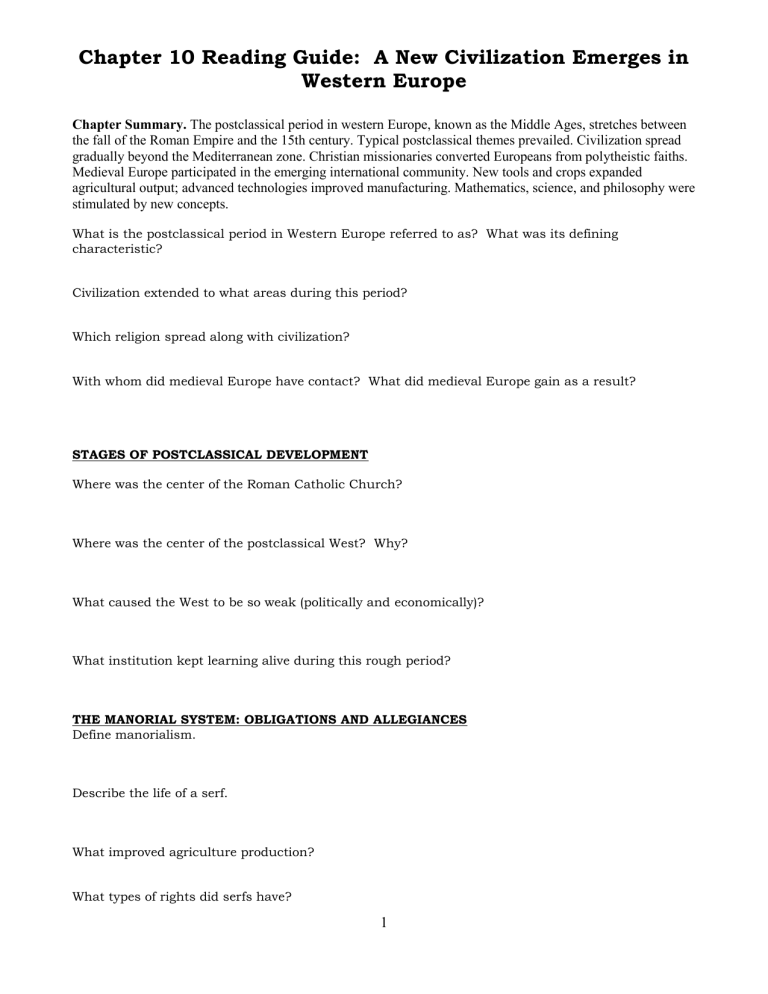
Chapter 10 Reading Guide: A New Civilization Emerges in
Western Europe
Chapter Summary.
The postclassical period in western Europe, known as the Middle Ages, stretches between the fall of the Roman Empire and the 15th century. Typical postclassical themes prevailed. Civilization spread gradually beyond the Mediterranean zone. Christian missionaries converted Europeans from polytheistic faiths.
Medieval Europe participated in the emerging international community. New tools and crops expanded agricultural output; advanced technologies improved manufacturing. Mathematics, science, and philosophy were stimulated by new concepts.
What is the postclassical period in Western Europe referred to as? What was its defining characteristic?
Civilization extended to what areas during this period?
Which religion spread along with civilization?
With whom did medieval Europe have contact? What did medieval Europe gain as a result?
STAGES OF POSTCLASSICAL DEVELOPMENT
Where was the center of the Roman Catholic Church?
Where was the center of the postclassical West? Why?
What caused the West to be so weak (politically and economically)?
What institution kept learning alive during this rough period?
THE MANORIAL SYSTEM: OBLIGATIONS AND ALLEGIANCES
Define manorialism.
Describe the life of a serf.
What improved agriculture production?
What types of rights did serfs have?
1
Chapter 10 Reading Guide: A New Civilization Emerges in
Western Europe
THE CHURCH: POLITICAL AND SPIRITUAL POWER
What did the Roman Catholic Church model their organizational structure after? Explain.
In what ways were the lines between church and state blurred?
What did the pope do?
What did Clovis use Christianity for? (Similar to African kings converting to Islam)
What purpose did the monasteries serve?
CHARLEMAGNE AND HIS SUCCESSORS
What positive strides did Charlemagne make toward civilization?
What united Western Europe?
What kept them from uniting completely?
What area claimed the title of “Holy Roman Emperor”? What was its true nature?
NEW ECONOMIC AND URBAN VIGOR
What economic gains did contact with the East bring?
What innovation gave landlords military dominance?
What happened to the Vikings in the 10 th century?
What was a result of fewer raids and new agricultural technology?
What was evidence of the new economic vitality of Europe?
2
Chapter 10 Reading Guide: A New Civilization Emerges in
Western Europe
How did their economic vitality and urban centers compare to China?
When did the first universities develop in Europe? What was their primary purpose?
FEUDAL MONARCHIES AND POLITICAL ADVANCES
Define and explain feudalism.
How was the governmental bureaucracy paid?
What other method did kings use to bring more land under their control?
Who extended the system of feudalism into England?
Who used this system earlier?
Why would merchants and professionals be more loyal than nobles? (like the eunuchs of Islam)
LIMITED GOVERNMENT
1215—How did the Magna Carta show the continued power of the aristocrats?
Who held the power in the newly developed parliaments?
What was the key issue parliaments ruled on?
What determined a person’s rights?
What was unique about Europe’s version of representative government?
THE WEST’S EXPANSIONIST IMPULSE
What does population growth tend to cause? And what was their motivation?
What was the “reconquest”? About how long did it take?
3
Chapter 10 Reading Guide: A New Civilization Emerges in
Western Europe
Who called for the First Crusade? When?
How were people persuaded to join?
Which Crusade was victorious for the Christians?
What Turk won back the lost land from the Christians?
What was the motivation of the Fourth Crusade?
How did the West benefit from the Crusades though their initial goal was a failure?
RELIGIOUS REFORM AND EVOLUTION
What secular problem did the Church struggle with?
What was one way they sought to reform it?
What did Pope Gregory VII institute to try to uphold the purity of the church? When?
What did Pope Gregory VII do to end state interference in the church?
THE HIGH MIDDLE AGES
When was it?
What 3 ingredients fed the dynamism of the High Middle Ages?
What political, cultural, and social tensions existed during the High Middle Ages?
THINKING HISTORICALLY—WESTERN CIVILIZATION (231)
Was there a Western civilization before the postclassical period?
What were the defining features of Western civilization by the end of the postclassical period?
4
Chapter 10 Reading Guide: A New Civilization Emerges in
Western Europe
What did Western leaders copy from other civilizations?
WESTERN CULTURE IN THE POSTCLASSICAL ERA
THEOLOGY: ASSIMILATING FAITH AND REASON
What was the focus of intellectual thought?
What did Peter Abelard contribute to the conversation?
How engaged was the average person in the debate over reason and religion?
What view did St. Bernard of Clairvaux advocate?
How were schools in the West different from China?
How did Thomas Aquinas link reason and faith?
What is scholasticism?
What was the Christian view of scientific research?
POPULAR RELIGION
List examples of syncretism as Christianity was adopted in Europe.
RELIGIOUS THEMES IN ART AND LITERATURE
What was the purpose of medieval art?
What was the popular architectural form? (look to image 10.5 on pg 228)
What was the subject of Chaucer’s Canterbury Tales?
5
Chapter 10 Reading Guide: A New Civilization Emerges in
Western Europe
What was the change in formal language used in literature and plays? Why is this a big deal?
CHANGING ECONOMIC AND SOCIAL FORMS IN THE POSTCLASSICAL CENTURIES
What products helped lay the foundation of a common commercial zone for the West?
NEW STRAINS IN RURAL LIFE
How had serf’s economic standing changed?
How did this affect the interaction between aristocrats and peasants?
How did Europe’s level of technology compare to other areas?
GROWTH OF TRADE AND BANKING
Who was opposed to the use of money?
Give examples of the first capitalist ventures.
What group of people benefited from the rejuvenated Mediterranean trade post-Crusades?
What commodities were mainly sought?
What was an example of a commercial alliance formed?
Where was it better to be a merchant? (Christian, Muslim or Indian societies) Why?
What was the purpose of a guild?
What area of specialized technology did Europe lead the world?
6
Chapter 10 Reading Guide: A New Civilization Emerges in
Western Europe
LIMITED SPHERE FOR WOMEN
How did advanced agriculture change women’s lives (just like every other time)?
How did this conflict a little with the original ideals of Christianity?
What new institution valued women’s contributions?
Compare and contrast women in Christianity and Islam.
THE DECLINE OF THE MEDIEVAL SYNTHESIS
What European conflict weakened and strained their governments and treasuries?
What were the military turning points during the Hundred Years’ War?
What were the other signs of decline (remember Conrad Demarest’s Model of Empire)?
SIGNS OF STRAIN
How was the role played by aristocrats challenged at the end of the medieval period?
How did they combat the declining role?
In what ways did the church lose some of its role/influence? Why?
THE POSTCLASSICAL WEST AND ITS HERITAGE
Why is this period in European history referred to as backward?
What developments demonstrated the dynamism of medieval Europe?
Why is the medieval period one of imitation?
Who had comparable divided political rule?
7
Chapter 10 Reading Guide: A New Civilization Emerges in
Western Europe
How was Europe unique?
GLOBAL CONNECTIONS: MEDIEVAL EUROPE AND THE WORLD
Why did Europe “hate” the outside world, esp. during the early Middle Ages?
Why, at the same time, did Europe have a more positive attitude towards the outside world?
How did Western Europe’s role in the transcontinental network change during the post-classical period?
Why weren’t other peoples particularly interested in Europe during this period?

